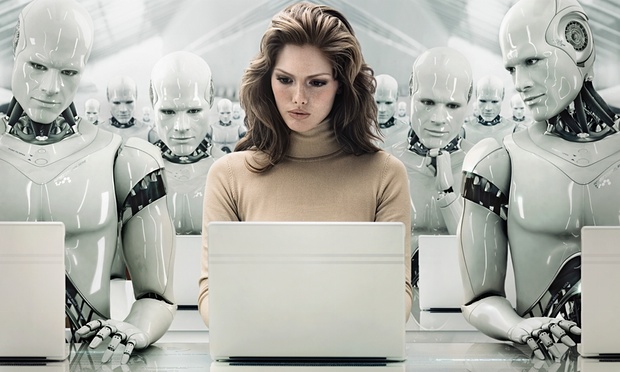Many individuals are pondering the social impact artificial intelligence will place on the future of our society. Whether it be a drastic change in the workforce, or a major improvement in our research, artificial intelligence sparks a fear of the unknown. Some people believe it will lead to a utopian society with no work and plenty of leisure time, whereas others view it as a social nightmare. Wherever you stand on the spectrum, it is important we educate ourselves on the matter to be aware of the possible implications. When it comes to employment, many positions are already being performed by the use of intelligent machines. Duties such as customer service, and financial analysts are no longer craving the need for human workers. Unfortunately “the new coming wave of automation is blind to the color of your collar” (CBS Interactive Inc, 2015).As you all may know just as machines changed the assembly line, they now have even more power with access to tons of data. This can eventually cause a major decrease in the size of white collar workers. Although many of these jobs require extensive training and expertise, many of the tasks are repetitive which can in the end be completed by robots.
According to the Atlantic, “two Oxford researchers analyzed the skills necessary for over 700 different occupations to determine how many would be dominated by machines in the near future. From the results they concluded that automation is likely to take over 47% of today’s jobs within a few decades” (Kaplan, 2015). What also struck us as interesting was the look between male and female dominated jobs. Based on future predictions, “The jobs performed primarily by women are relatively safe, while those typically performed by men are at risk” (Kaplan, 2015). No matter how we choose to look at it we can’t deny the fact that we have a huge gender bias when it comes to occupations in the workforce. Society has unconsciously labeled professions that are typically executed by each gender. For example, “out of the 3 million truck drivers in the US, 95% of them are men, this also goes for majority of the carpentry and construction workers as well. Therefore, when analyzing the administrative and secretary positions, 95% are performed by women” (Kaplan, 2015). Many of these speculations are due to the fact most jobs labeled as “male dominated” include lots of manipulation and physical movement during the task. With these specific occupations they are likely to be repetitive and much easier to measure performance. Robots will be able to successfully complete jobs in this manner by the utilization of sensors that will inform and monitor their progress of completion. On the other hand, women normally work in “unstructured environments, where the ability to read people’s emotions and intentions are critical to success” (Kaplan, 2015).So if your job involves creativity, emotion, critical thinking, and innovation you should be the least bit worried that your job will be taken in the near future. “The broader and more varied your duties are the harder it will be to replace you” (Kaplan, 2015).
Instead of taking over most of the jobs by 2025 there will most likely be a shift in the sector creating new jobs for individuals as well as expanding unfamiliar horizons. Are we mentally prepared to work alongside AI? According to Automated Insights CEO Robbie Allen, he believed “our future is going to be much more of a humans and software working together” (CBS Interactive Inc, 2015). Artificial Intelligence can ultimately help us reach new heights when it comes to solving complex issues in our world. Machines can work alongside experts in order to provide them with the proper information they need to make more effective and efficient decisions. Based on Mark Nall, a program manager for NASA predicts “the social consequence is that good paying jobs will be increasingly scarce.”(Smith & Anderson, 2014) This can have a huge effect on our lives as a society and ultimately make the job market a lot more strategically competitive.
Preparation for the future of jobs are also a concern of many individuals. Experts surveyed in the Pew Research Center explained, “For instance, many are concerned that our existing social structures and especially our educational institutions are not adequately preparing people for the skills that will be needed in the job market of the future. Conversely, others have hope that the coming changes will be an opportunity to reassess our society’s relationship to employment itself by returning to a focus on small-scale or artisanal modes of production, or by giving people more time to spend on leisure, self-improvement, or time with loved ones”(Smith & Anderson, 2014). In other words our concept of “work” of the future will change significantly. 
References
CBS News. “Will artificial intelligence overtake humans in the workforce.” CBS Interactive Inc. 5 Sept. 2015. Web 27 Nov. 2015.
Kaplan, Jerry. “The Age of the Robot Worker Will be Worse for Men.” The Atlantic. 4 Aug. 2015. Web. 27 Nov. 2015.
Smith & Anderson. “AI, Robotics, and the Future of Jobs.” Pew Research Center. 6 Aug. 2014. Web. 30 Nov. 2015.
In my opinion, the social impact artificial intelligence will place on the future of our society. At least, I believe it will happen in the nearest future. Just because I read http://bigessaywriter.com/blog/artificial-intelligence-impact-on-education, and finally understood what is what!
ReplyDelete